小学英语译林版(三起)六年级上册期末专项特训:阅读判断(含答案)
文档属性
| 名称 | 小学英语译林版(三起)六年级上册期末专项特训:阅读判断(含答案) |
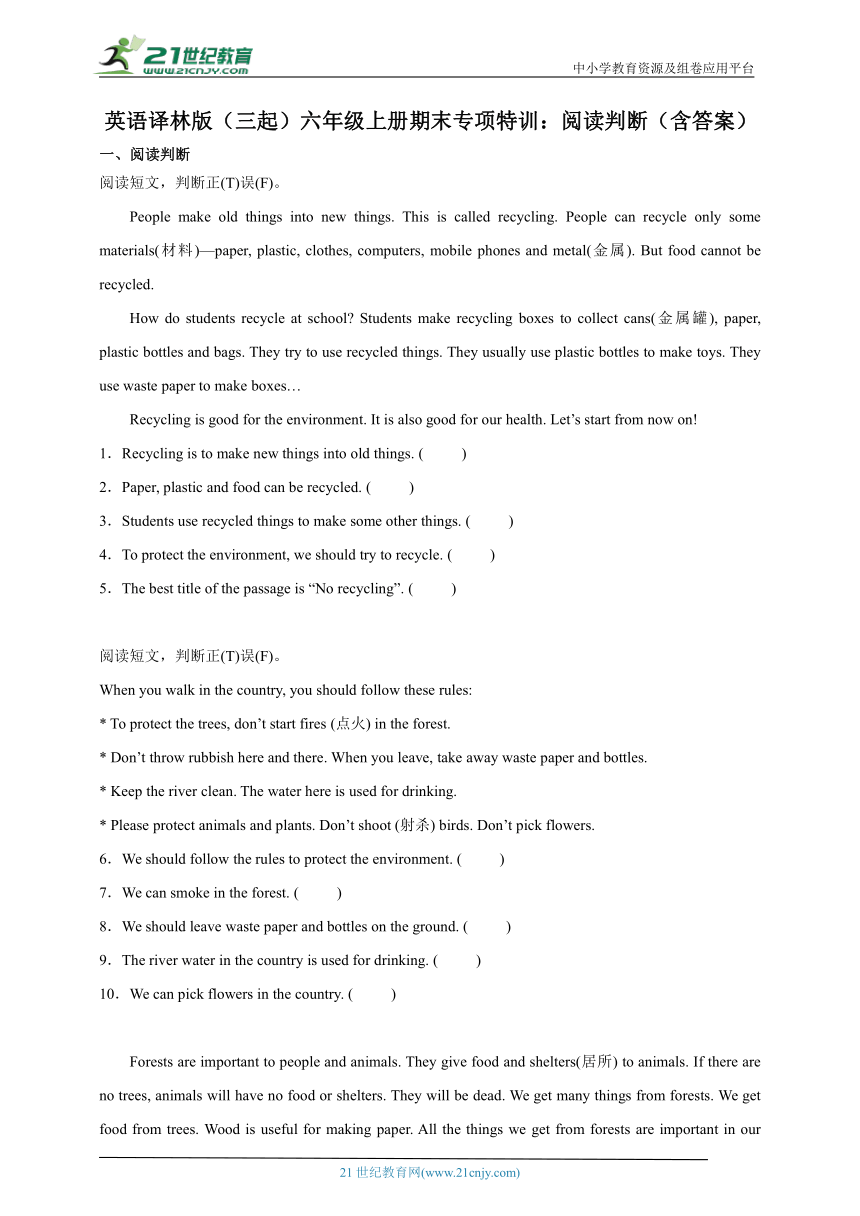
|
|
| 格式 | docx | ||
| 文件大小 | 978.6KB | ||
| 资源类型 | 试卷 | ||
| 版本资源 | 牛津译林版 | ||
| 科目 | 英语 | ||
| 更新时间 | 2023-12-06 00:00:00 | ||
图片预览

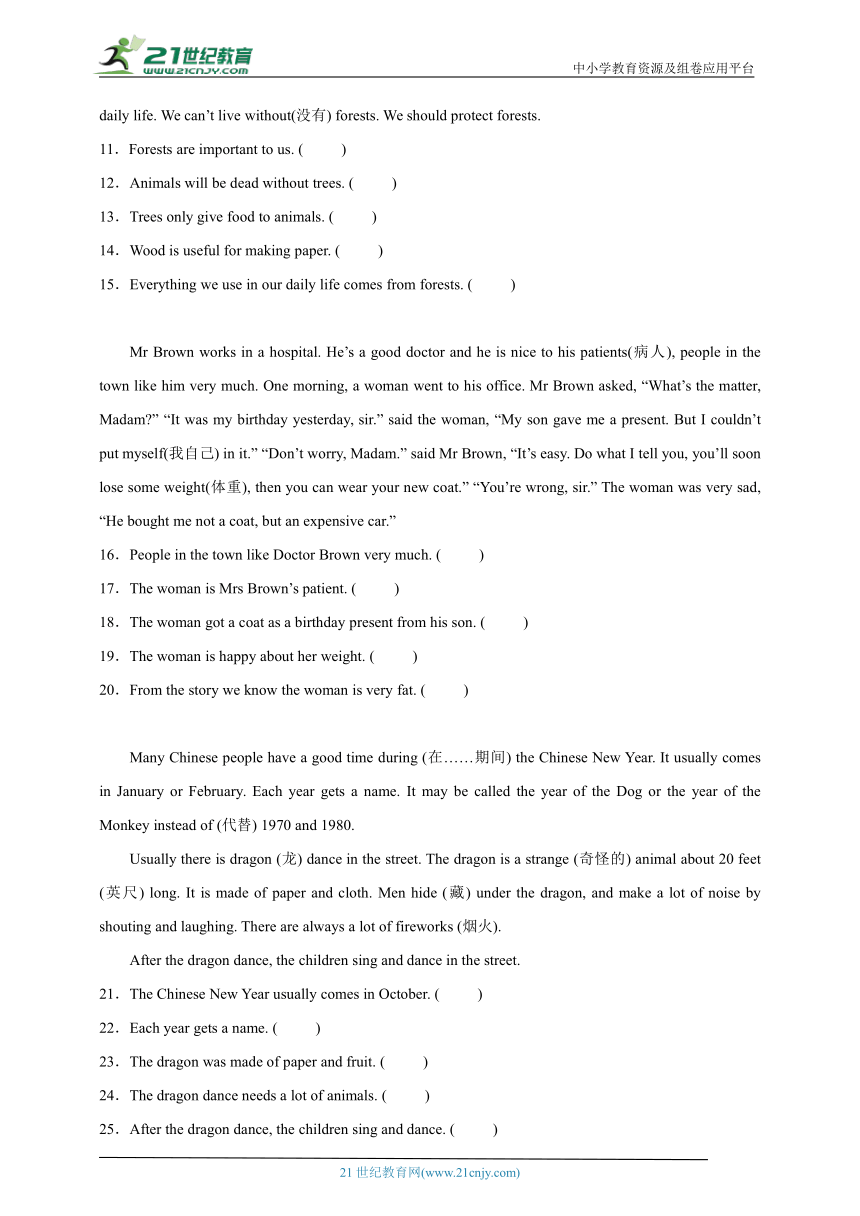
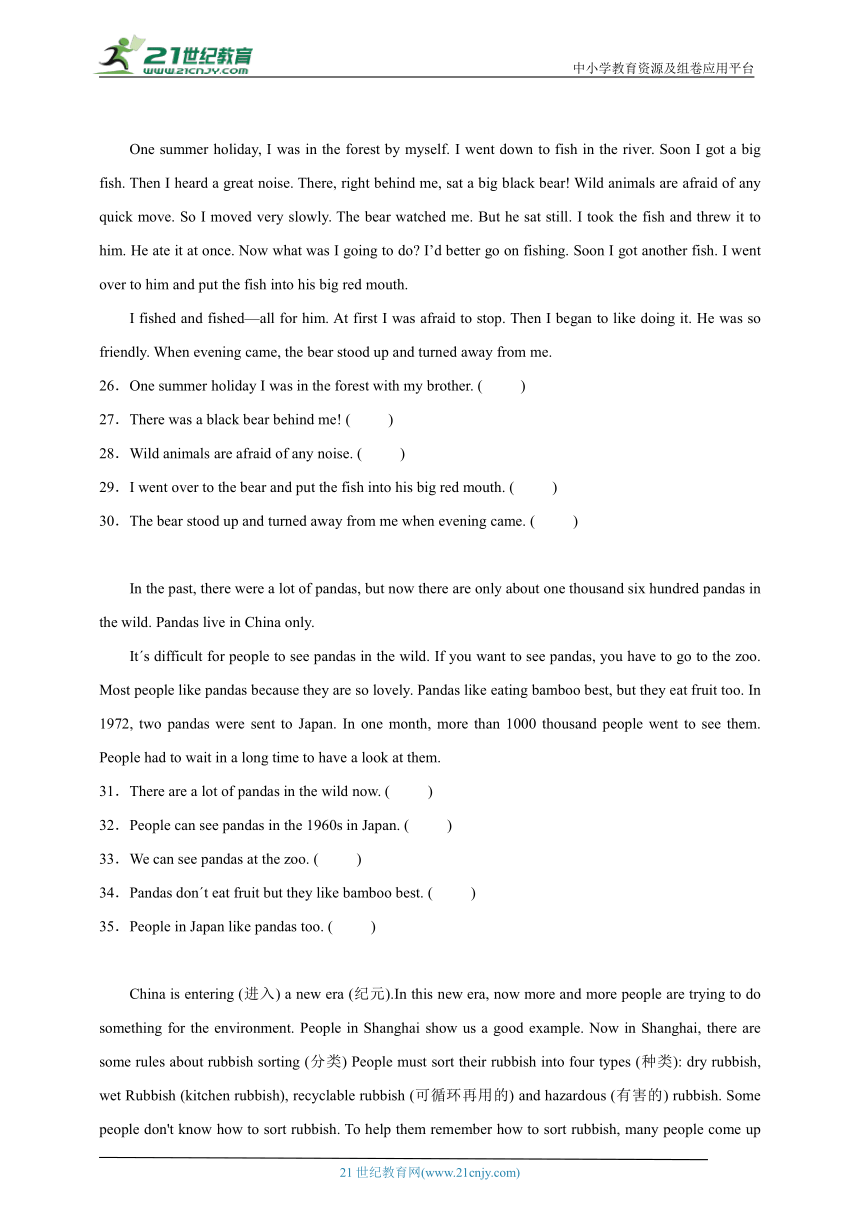
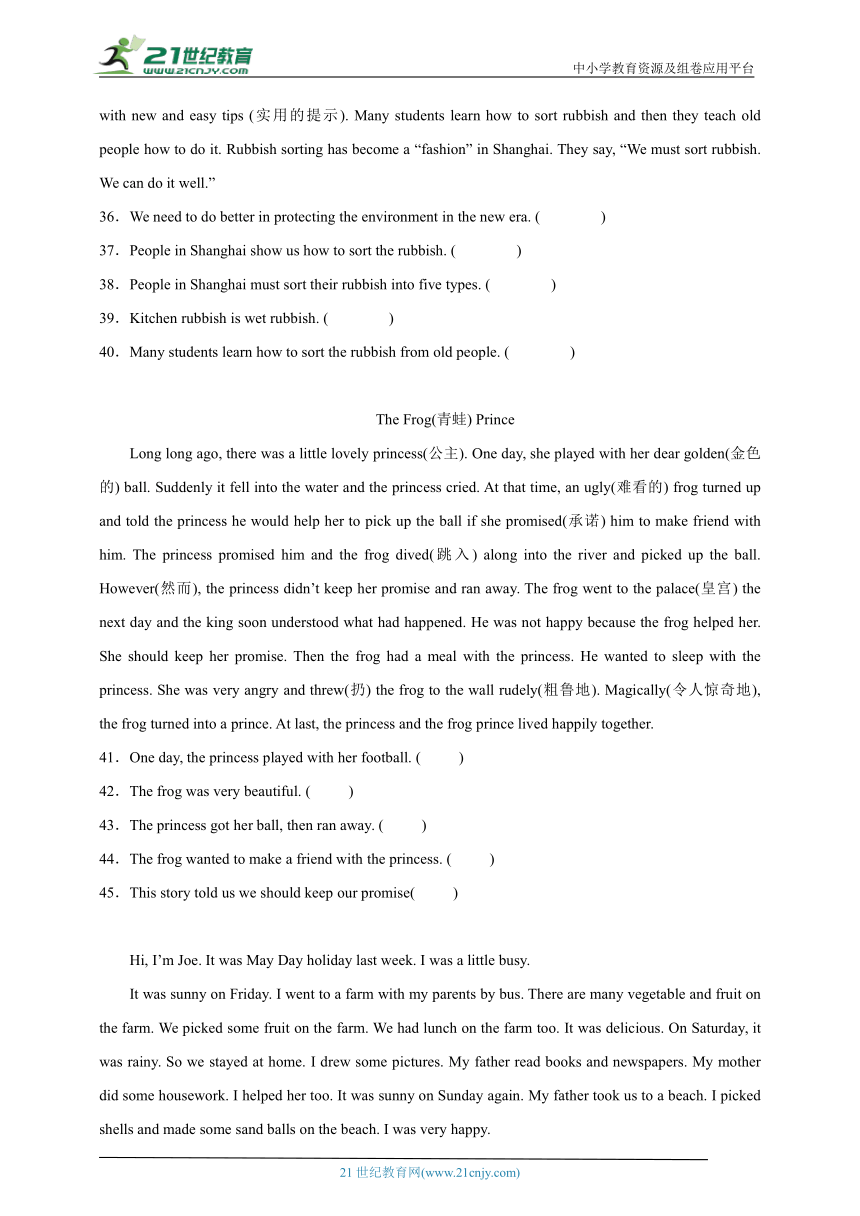
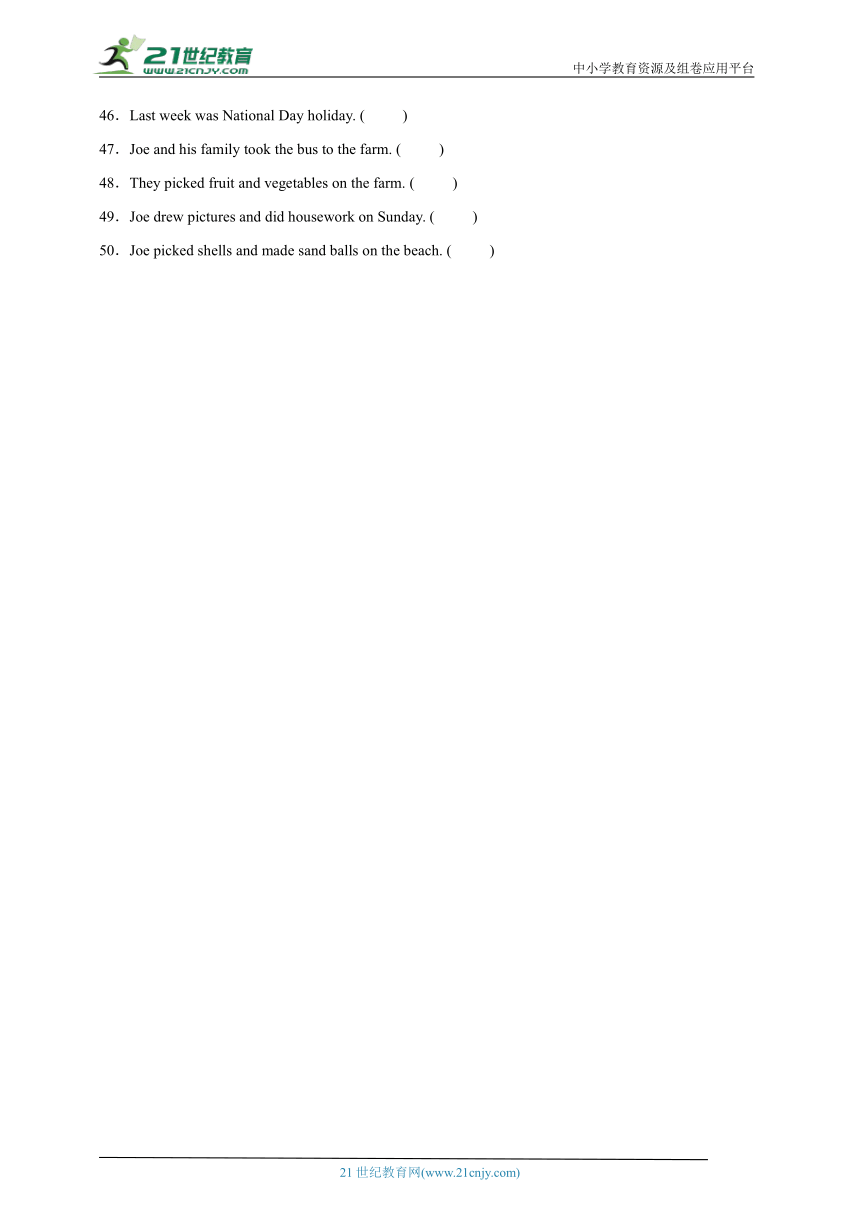
文档简介
中小学教育资源及组卷应用平台
英语译林版(三起)六年级上册期末专项特训:阅读判断(含答案)
一、阅读判断
阅读短文,判断正(T)误(F)。
People make old things into new things. This is called recycling. People can recycle only some materials(材料)—paper, plastic, clothes, computers, mobile phones and metal(金属). But food cannot be recycled.
How do students recycle at school Students make recycling boxes to collect cans(金属罐), paper, plastic bottles and bags. They try to use recycled things. They usually use plastic bottles to make toys. They use waste paper to make boxes…
Recycling is good for the environment. It is also good for our health. Let’s start from now on!
1.Recycling is to make new things into old things. ( )
2.Paper, plastic and food can be recycled. ( )
3.Students use recycled things to make some other things. ( )
4.To protect the environment, we should try to recycle. ( )
5.The best title of the passage is “No recycling”. ( )
阅读短文,判断正(T)误(F)。
When you walk in the country, you should follow these rules:
* To protect the trees, don’t start fires (点火) in the forest.
* Don’t throw rubbish here and there. When you leave, take away waste paper and bottles.
* Keep the river clean. The water here is used for drinking.
* Please protect animals and plants. Don’t shoot (射杀) birds. Don’t pick flowers.
6.We should follow the rules to protect the environment. ( )
7.We can smoke in the forest. ( )
8.We should leave waste paper and bottles on the ground. ( )
9.The river water in the country is used for drinking. ( )
10.We can pick flowers in the country. ( )
Forests are important to people and animals. They give food and shelters(居所) to animals. If there are no trees, animals will have no food or shelters. They will be dead. We get many things from forests. We get food from trees. Wood is useful for making paper. All the things we get from forests are important in our daily life. We can’t live without(没有) forests. We should protect forests.
11.Forests are important to us. ( )
12.Animals will be dead without trees. ( )
13.Trees only give food to animals. ( )
14.Wood is useful for making paper. ( )
15.Everything we use in our daily life comes from forests. ( )
Mr Brown works in a hospital. He’s a good doctor and he is nice to his patients(病人), people in the town like him very much. One morning, a woman went to his office. Mr Brown asked, “What’s the matter, Madam ” “It was my birthday yesterday, sir.” said the woman, “My son gave me a present. But I couldn’t put myself(我自己) in it.” “Don’t worry, Madam.” said Mr Brown, “It’s easy. Do what I tell you, you’ll soon lose some weight(体重), then you can wear your new coat.” “You’re wrong, sir.” The woman was very sad, “He bought me not a coat, but an expensive car.”
16.People in the town like Doctor Brown very much. ( )
17.The woman is Mrs Brown’s patient. ( )
18.The woman got a coat as a birthday present from his son. ( )
19.The woman is happy about her weight. ( )
20.From the story we know the woman is very fat. ( )
Many Chinese people have a good time during (在……期间) the Chinese New Year. It usually comes in January or February. Each year gets a name. It may be called the year of the Dog or the year of the Monkey instead of (代替) 1970 and 1980.
Usually there is dragon (龙) dance in the street. The dragon is a strange (奇怪的) animal about 20 feet (英尺) long. It is made of paper and cloth. Men hide (藏) under the dragon, and make a lot of noise by shouting and laughing. There are always a lot of fireworks (烟火).
After the dragon dance, the children sing and dance in the street.
21.The Chinese New Year usually comes in October. ( )
22.Each year gets a name. ( )
23.The dragon was made of paper and fruit. ( )
24.The dragon dance needs a lot of animals. ( )
25.After the dragon dance, the children sing and dance. ( )
One summer holiday, I was in the forest by myself. I went down to fish in the river. Soon I got a big fish. Then I heard a great noise. There, right behind me, sat a big black bear! Wild animals are afraid of any quick move. So I moved very slowly. The bear watched me. But he sat still. I took the fish and threw it to him. He ate it at once. Now what was I going to do I’d better go on fishing. Soon I got another fish. I went over to him and put the fish into his big red mouth.
I fished and fished—all for him. At first I was afraid to stop. Then I began to like doing it. He was so friendly. When evening came, the bear stood up and turned away from me.
26.One summer holiday I was in the forest with my brother. ( )
27.There was a black bear behind me! ( )
28.Wild animals are afraid of any noise. ( )
29.I went over to the bear and put the fish into his big red mouth. ( )
30.The bear stood up and turned away from me when evening came. ( )
In the past, there were a lot of pandas, but now there are only about one thousand six hundred pandas in the wild. Pandas live in China only.
It s difficult for people to see pandas in the wild. If you want to see pandas, you have to go to the zoo. Most people like pandas because they are so lovely. Pandas like eating bamboo best, but they eat fruit too. In 1972, two pandas were sent to Japan. In one month, more than 1000 thousand people went to see them. People had to wait in a long time to have a look at them.
31.There are a lot of pandas in the wild now. ( )
32.People can see pandas in the 1960s in Japan. ( )
33.We can see pandas at the zoo. ( )
34.Pandas don t eat fruit but they like bamboo best. ( )
35.People in Japan like pandas too. ( )
China is entering (进入) a new era (纪元).In this new era, now more and more people are trying to do something for the environment. People in Shanghai show us a good example. Now in Shanghai, there are some rules about rubbish sorting (分类) People must sort their rubbish into four types (种类): dry rubbish, wet Rubbish (kitchen rubbish), recyclable rubbish (可循环再用的) and hazardous (有害的) rubbish. Some people don't know how to sort rubbish. To help them remember how to sort rubbish, many people come up with new and easy tips (实用的提示). Many students learn how to sort rubbish and then they teach old people how to do it. Rubbish sorting has become a “fashion” in Shanghai. They say, “We must sort rubbish. We can do it well.”
36.We need to do better in protecting the environment in the new era. ( )
37.People in Shanghai show us how to sort the rubbish. ( )
38.People in Shanghai must sort their rubbish into five types. ( )
39.Kitchen rubbish is wet rubbish. ( )
40.Many students learn how to sort the rubbish from old people. ( )
The Frog(青蛙) Prince
Long long ago, there was a little lovely princess(公主). One day, she played with her dear golden(金色的) ball. Suddenly it fell into the water and the princess cried. At that time, an ugly(难看的) frog turned up and told the princess he would help her to pick up the ball if she promised(承诺) him to make friend with him. The princess promised him and the frog dived(跳入) along into the river and picked up the ball. However(然而), the princess didn’t keep her promise and ran away. The frog went to the palace(皇宫) the next day and the king soon understood what had happened. He was not happy because the frog helped her. She should keep her promise. Then the frog had a meal with the princess. He wanted to sleep with the princess. She was very angry and threw(扔) the frog to the wall rudely(粗鲁地). Magically(令人惊奇地), the frog turned into a prince. At last, the princess and the frog prince lived happily together.
41.One day, the princess played with her football. ( )
42.The frog was very beautiful. ( )
43.The princess got her ball, then ran away. ( )
44.The frog wanted to make a friend with the princess. ( )
45.This story told us we should keep our promise( )
Hi, I’m Joe. It was May Day holiday last week. I was a little busy.
It was sunny on Friday. I went to a farm with my parents by bus. There are many vegetable and fruit on the farm. We picked some fruit on the farm. We had lunch on the farm too. It was delicious. On Saturday, it was rainy. So we stayed at home. I drew some pictures. My father read books and newspapers. My mother did some housework. I helped her too. It was sunny on Sunday again. My father took us to a beach. I picked shells and made some sand balls on the beach. I was very happy.
46.Last week was National Day holiday. ( )
47.Joe and his family took the bus to the farm. ( )
48.They picked fruit and vegetables on the farm. ( )
49.Joe drew pictures and did housework on Sunday. ( )
50.Joe picked shells and made sand balls on the beach. ( )
参考答案:
1.F 2.F 3.T 4.T 5.F
【导语】本文讲述了我们为了保护环境,要做好回收工作。
1.句意:回收就是把新东西变成旧东西。根据“People make old things into new things. This is called recycling. ”可知回收是把旧东西变成新东西。故答案为F。
2.句意:纸张、塑料和食物都可以回收利用。根据“People can recycle only some materials(材料)—paper, plastic, clothes, computers, mobile phones and metal(金属). But food cannot be recycled.”可是食物不能回收。故答案为F。
3.句意:学生们用回收的东西做一些其他的东西。根据“They usually use plastic bottles to make toys. They use waste paper to make boxes…”可知题干描述正确,故答案为T。
4.句意:为了保护环境,我们应该尽量回收利用。根据“Recycling is good for the environment. ”可知题干描述正确,故答案为T。
5.句意:这篇文章最好的标题是“不回收”。本文主要讲的是为了保护环境而回收。故答案为F。
6.T 7.F 8.F 9.T 10.F
【导语】本文主要介绍了在农村漫步,应该遵循的规则。
6.句意:我们应该按着规则来保护环境。本文列举了一些规则,都是有关环境保护的,句子和短文内容相符,故答案为T。
7.句意:我们可以在森林里吸烟。根据“To protect the trees, don’t start fires (点火) in the forest.”可知不能在森林里点火,也就是不能吸烟,句子和短文内容不符,故答案为F。
8.句意:我们应该把废纸和瓶子留在地面上。根据“When you leave, take away waste paper and bottles.”可知当你离开的时候,把废纸和瓶子带走,不能留在地面上,句子和短文内容不符,故答案为F。
9.句意:在农村,河水是用来喝的。根据“Keep the river clean. The water here is used for drinking.”可知农村的河水是用来喝的,句子和短文内容相符,故答案为T。
10.句意:我们可以在农村摘花。根据“Don’t pick flowers.”可知不能摘花,句子和短文内容不符,故答案为F。
11.T 12.T 13.F 14.T 15.F
【导语】本文介绍的是森林的重要性。
11.句意:森林对于我们很重要。根据文章“Forests are important to people and animals. ”得知森林对于我们很重要。句意与原文意思相符,故答案为T。
12.句意:没有树动物将会死。根据文章“ If there are no trees, animals will have no food or shelters. They will be dead. ”得知如果没有树,动物就会死。句意与原文意思相符,故答案为T。
13.句意:树只给动物提供食物。根据文章“They give food and shelters(居所) to animals. ”得知树给植物提供食物和住所。句意与原文意思不符,故答案为F。
14.句意:木材用于造纸。根据文章“Wood is useful for making paper.”得知木材用于造纸。句意与原文意思相符,故答案为T。
15.句意:我们日常生活中使用的一切都来自森林。根据文章“All the things we get from forests are important in our daily life. ”得知我们从森林中得到的一切在我们的日常生活中都很重要。句意与原文意思不符,故答案为F。
16.T 17.F 18.F 19.F 20.T
【导语】本文主要讲述了布朗医生和他的病人之间的故事。
16.句意:镇子上的人非常喜欢布朗医生。根据原文“people in the town like him very much.”可知镇子上的人很喜欢布朗医生,句子描述正确,故答案为T。
17.句意:这位女士是布朗太太的病人。结合全文可知这位女士是布朗先生的病人,文章中并没有提到过布朗太太,句子描述错误,故答案为F。
18.句意:这位女士收到了她儿子送的生日礼物,一件外套。根据原文“He bought me not a coat, but an expensive car.”可知这位女士收到的生日礼物是一辆昂贵的车子,不是外套,句子描述错误,故答案为F。
19.句意:这位女士为她的体重感到开心。根据原文“It’s easy. Do what I tell you, you’ll soon lose some weight”可知医生在想办法帮她减肥,因此可以推测出,这位女士的体重不会使她感到开心,句子描述错误,故答案为F。
20.句意:从这个故事里可以了解到这位女士很胖。根据原文“My son gave me a present. But I couldn’t put myself(我自己) in it.”并结合第三小题可知这位女士坐不进车子里,由上一题可知医生在准备给她减肥,因此可以推断出这位女士很胖,句子描述正确,故答案为T。
21.F 22.T 23.F 24.F 25.T
【分析】本文介绍了中国的新年并特别介绍了舞龙。
21.题干句意:中国的新年通常在十月。根据It usually comes in January or February.可知中国的新年通常在一月或二月。故题干错误,故答案为F。
22.题干句意:每年都有一个名字。根据Each year gets a name.可知题干正确,故答案为T。
23.题干句意:龙是用纸和水果做成的。根据It is made of paper and cloth. 可知它是用纸和布做成的。故题干错误,故答案为F。
24.题干句意:舞龙需要很多动物。根据Men hide (藏) under the dragon, and make a lot of noise by shouting and laughing.可知舞龙需要很多人。故题干错误,故答案为F。
25.题干句意:舞龙比赛之后,孩子们唱歌和跳舞。根据After the dragon dance, the children sing and dance in the street.可知题干正确,故答案为T。
【点睛】
26.F 27.T 28.F 29.T 30.T
【分析】本文讲了作者去钓鱼,遇到了一只大黑熊,作者给它捕鱼的事情。
26.句意:一个暑假,我和弟弟在森林里。根据One summer holiday, I was in the forest by myself. 可知一个暑假,作者自己在森林里,故答案为F。
27.句意:我身后有一只黑熊!根据There, right behind me, sat a big black bear! 可知作者身后一只大黑熊,故答案为T。
28.句意:野生动物害怕任何噪音。根据Wild animals are afraid of any quick move. 可知野生动物害怕任何快速的移动,故答案为F。
29.句意:我走到熊跟前,把鱼放进它红色的大嘴里。根据 I went over to him and put the fish into his big red mouth. 可知作者走到熊跟前,把鱼放进它红色的大嘴里,故答案为T。
30.句意:夜幕降临时,熊站了起来,转身离开了我。根据When evening came, the bear stood up and turned away from me. 可知夜幕降临时,熊站了起来,转身离开了作者,故答案为T。
31.F 32.F 33.T 34.T 35.T
【分析】本文讲述了熊猫在过去和现在数量的对比,它们的习性和饮食等。
31.题干句意:现在在自然环境中有很多熊猫。根据In the past, there were a lot of pandas, but now there are only about one thousand six hundred pandas in the wild. 可知自然环境中只有大约一千六百只熊猫了。故题干错误,故答案为F。
32.题干句意:在二十世纪六十年代在日本人们能看到熊猫。根据 In 1972, two pandas were sent to Japan.可知是二十世纪七十年代,两只熊猫被送往日本。故题干错误,故答案为F。
33.题干句意:我们在动物园里能看到熊猫。根据If you want to see pandas, you have to go to the zoo.可知题干正确,故答案为T。
34.题干句意:熊猫不吃水果但是它们最喜欢竹子。根据Pandas like eating bamboo best, but they eat fruit too. 可知题干正确,故答案为T。
35.题干句意:日本的熊猫也喜欢竹子。根据Pandas like eating bamboo best, but they eat fruit too. 可知题干正确,故答案为T。
【点睛】
36.T 37.T 38.F 39.T 40.F
【分析】该篇主要讲述垃圾如何分类及怎样帮助人们更好的分类垃圾。
36.句意:在新的时代,我们需要更好地保护环境。根据China is entering (进入) a new era (纪元).In this new era, now more and more people are trying to do something for the environment.可知该句是正确的。故答案为T。
37.句意:上海的人教我们怎么把垃圾分类。根据People in Shanghai show us a good example.可知该句是正确的。故答案为T。
38.句意:上海人必须把垃圾分成五类。根据Now in Shanghai, there are some rules about rubbish sorting (分类) People must sort their rubbish into four types (种类).可知上海人必须把垃圾分成四类。故答案为F。
39.句意:厨房垃圾是湿的垃圾。根据wet Rubbish (kitchen rubbish).可知该句是正确的。故答案为T。
40.句意:许多学生从老人身上学习如何把垃圾分类。根据Many students learn how to sort rubbish and then they teach old people how to do it.可知许多学生教老人如何分类垃圾。故答案为F。
41.F 42.F 43.T 44.T
45.T
【分析】短文主要讲述了青蛙王子的故事。
41.句意:有一天,公主玩她的足球。根据文中句子One day, she played with her dear golden(金色的) ball.可知有一天,公主在玩她的金球。故答案为F。
42.句意:青蛙非常漂亮。根据文中句子At that time, an ugly(难看的) frog turned up and told the princess he would help her to pick up the ball if she promised(承诺) him to make friend with him. 可知青蛙是难看的,故答案为F。
43.句意:公主拿到了她的球,然后跑了。根据文中句子However(然而), the princess didn’t keep her promise and ran away. 可知公主逃跑了,故答案为T。
44.句意:青蛙想和公主交朋友。根据文中句子At that time, an ugly(难看的) frog turned up and told the princess he would help her to pick up the ball if she promised(承诺) him to make friend with him. 可知青蛙想和公主交朋友,故答案为T。
45.句意:这个故事告诉我们应该遵守我们的诺言。根据短文内容可知这篇短文是要告诉我们应该遵守诺言,故答案为T。
【点睛】
46.F 47.T 48.F 49.F 50.T
【分析】46.句意:上周是国庆节假期。根据It was May Day holiday last week.上周是五一假期。可知句子与短文不符,故答案为F。
47.句意:乔和他的家人乘公共汽车去了农场。根据 I went to a farm with my parents by bus.,可知我和父母乘公共汽车去了农场。可知句子与短文相符,故答案为T。
48.句意:他们在农场里摘水果和蔬菜。根据We picked some fruit on the farm. 我们在农场摘了一些水果。可知句子与短文不符,故答案为F。
49.句意:乔在星期天画画和做家务。根据On Saturday, it was rainy. So we stayed at home. I drew some pictures. My father read books and newspapers. My mother did some housework. I helped her too.,可知星期六我画了一些画。我妈妈做了一些家务。我也帮助了她。可知句子与短文不符,故答案为F。
50.句意:乔在海滩上捡贝壳和做沙球。根据 I picked shells and made some sand balls on the beach. 我捡了贝壳,在沙滩上做了一些沙球。可知句子与短文相符,故答案为T。
【点睛】
21世纪教育网 www.21cnjy.com 精品试卷·第 2 页 (共 2 页)
21世纪教育网(www.21cnjy.com)
英语译林版(三起)六年级上册期末专项特训:阅读判断(含答案)
一、阅读判断
阅读短文,判断正(T)误(F)。
People make old things into new things. This is called recycling. People can recycle only some materials(材料)—paper, plastic, clothes, computers, mobile phones and metal(金属). But food cannot be recycled.
How do students recycle at school Students make recycling boxes to collect cans(金属罐), paper, plastic bottles and bags. They try to use recycled things. They usually use plastic bottles to make toys. They use waste paper to make boxes…
Recycling is good for the environment. It is also good for our health. Let’s start from now on!
1.Recycling is to make new things into old things. ( )
2.Paper, plastic and food can be recycled. ( )
3.Students use recycled things to make some other things. ( )
4.To protect the environment, we should try to recycle. ( )
5.The best title of the passage is “No recycling”. ( )
阅读短文,判断正(T)误(F)。
When you walk in the country, you should follow these rules:
* To protect the trees, don’t start fires (点火) in the forest.
* Don’t throw rubbish here and there. When you leave, take away waste paper and bottles.
* Keep the river clean. The water here is used for drinking.
* Please protect animals and plants. Don’t shoot (射杀) birds. Don’t pick flowers.
6.We should follow the rules to protect the environment. ( )
7.We can smoke in the forest. ( )
8.We should leave waste paper and bottles on the ground. ( )
9.The river water in the country is used for drinking. ( )
10.We can pick flowers in the country. ( )
Forests are important to people and animals. They give food and shelters(居所) to animals. If there are no trees, animals will have no food or shelters. They will be dead. We get many things from forests. We get food from trees. Wood is useful for making paper. All the things we get from forests are important in our daily life. We can’t live without(没有) forests. We should protect forests.
11.Forests are important to us. ( )
12.Animals will be dead without trees. ( )
13.Trees only give food to animals. ( )
14.Wood is useful for making paper. ( )
15.Everything we use in our daily life comes from forests. ( )
Mr Brown works in a hospital. He’s a good doctor and he is nice to his patients(病人), people in the town like him very much. One morning, a woman went to his office. Mr Brown asked, “What’s the matter, Madam ” “It was my birthday yesterday, sir.” said the woman, “My son gave me a present. But I couldn’t put myself(我自己) in it.” “Don’t worry, Madam.” said Mr Brown, “It’s easy. Do what I tell you, you’ll soon lose some weight(体重), then you can wear your new coat.” “You’re wrong, sir.” The woman was very sad, “He bought me not a coat, but an expensive car.”
16.People in the town like Doctor Brown very much. ( )
17.The woman is Mrs Brown’s patient. ( )
18.The woman got a coat as a birthday present from his son. ( )
19.The woman is happy about her weight. ( )
20.From the story we know the woman is very fat. ( )
Many Chinese people have a good time during (在……期间) the Chinese New Year. It usually comes in January or February. Each year gets a name. It may be called the year of the Dog or the year of the Monkey instead of (代替) 1970 and 1980.
Usually there is dragon (龙) dance in the street. The dragon is a strange (奇怪的) animal about 20 feet (英尺) long. It is made of paper and cloth. Men hide (藏) under the dragon, and make a lot of noise by shouting and laughing. There are always a lot of fireworks (烟火).
After the dragon dance, the children sing and dance in the street.
21.The Chinese New Year usually comes in October. ( )
22.Each year gets a name. ( )
23.The dragon was made of paper and fruit. ( )
24.The dragon dance needs a lot of animals. ( )
25.After the dragon dance, the children sing and dance. ( )
One summer holiday, I was in the forest by myself. I went down to fish in the river. Soon I got a big fish. Then I heard a great noise. There, right behind me, sat a big black bear! Wild animals are afraid of any quick move. So I moved very slowly. The bear watched me. But he sat still. I took the fish and threw it to him. He ate it at once. Now what was I going to do I’d better go on fishing. Soon I got another fish. I went over to him and put the fish into his big red mouth.
I fished and fished—all for him. At first I was afraid to stop. Then I began to like doing it. He was so friendly. When evening came, the bear stood up and turned away from me.
26.One summer holiday I was in the forest with my brother. ( )
27.There was a black bear behind me! ( )
28.Wild animals are afraid of any noise. ( )
29.I went over to the bear and put the fish into his big red mouth. ( )
30.The bear stood up and turned away from me when evening came. ( )
In the past, there were a lot of pandas, but now there are only about one thousand six hundred pandas in the wild. Pandas live in China only.
It s difficult for people to see pandas in the wild. If you want to see pandas, you have to go to the zoo. Most people like pandas because they are so lovely. Pandas like eating bamboo best, but they eat fruit too. In 1972, two pandas were sent to Japan. In one month, more than 1000 thousand people went to see them. People had to wait in a long time to have a look at them.
31.There are a lot of pandas in the wild now. ( )
32.People can see pandas in the 1960s in Japan. ( )
33.We can see pandas at the zoo. ( )
34.Pandas don t eat fruit but they like bamboo best. ( )
35.People in Japan like pandas too. ( )
China is entering (进入) a new era (纪元).In this new era, now more and more people are trying to do something for the environment. People in Shanghai show us a good example. Now in Shanghai, there are some rules about rubbish sorting (分类) People must sort their rubbish into four types (种类): dry rubbish, wet Rubbish (kitchen rubbish), recyclable rubbish (可循环再用的) and hazardous (有害的) rubbish. Some people don't know how to sort rubbish. To help them remember how to sort rubbish, many people come up with new and easy tips (实用的提示). Many students learn how to sort rubbish and then they teach old people how to do it. Rubbish sorting has become a “fashion” in Shanghai. They say, “We must sort rubbish. We can do it well.”
36.We need to do better in protecting the environment in the new era. ( )
37.People in Shanghai show us how to sort the rubbish. ( )
38.People in Shanghai must sort their rubbish into five types. ( )
39.Kitchen rubbish is wet rubbish. ( )
40.Many students learn how to sort the rubbish from old people. ( )
The Frog(青蛙) Prince
Long long ago, there was a little lovely princess(公主). One day, she played with her dear golden(金色的) ball. Suddenly it fell into the water and the princess cried. At that time, an ugly(难看的) frog turned up and told the princess he would help her to pick up the ball if she promised(承诺) him to make friend with him. The princess promised him and the frog dived(跳入) along into the river and picked up the ball. However(然而), the princess didn’t keep her promise and ran away. The frog went to the palace(皇宫) the next day and the king soon understood what had happened. He was not happy because the frog helped her. She should keep her promise. Then the frog had a meal with the princess. He wanted to sleep with the princess. She was very angry and threw(扔) the frog to the wall rudely(粗鲁地). Magically(令人惊奇地), the frog turned into a prince. At last, the princess and the frog prince lived happily together.
41.One day, the princess played with her football. ( )
42.The frog was very beautiful. ( )
43.The princess got her ball, then ran away. ( )
44.The frog wanted to make a friend with the princess. ( )
45.This story told us we should keep our promise( )
Hi, I’m Joe. It was May Day holiday last week. I was a little busy.
It was sunny on Friday. I went to a farm with my parents by bus. There are many vegetable and fruit on the farm. We picked some fruit on the farm. We had lunch on the farm too. It was delicious. On Saturday, it was rainy. So we stayed at home. I drew some pictures. My father read books and newspapers. My mother did some housework. I helped her too. It was sunny on Sunday again. My father took us to a beach. I picked shells and made some sand balls on the beach. I was very happy.
46.Last week was National Day holiday. ( )
47.Joe and his family took the bus to the farm. ( )
48.They picked fruit and vegetables on the farm. ( )
49.Joe drew pictures and did housework on Sunday. ( )
50.Joe picked shells and made sand balls on the beach. ( )
参考答案:
1.F 2.F 3.T 4.T 5.F
【导语】本文讲述了我们为了保护环境,要做好回收工作。
1.句意:回收就是把新东西变成旧东西。根据“People make old things into new things. This is called recycling. ”可知回收是把旧东西变成新东西。故答案为F。
2.句意:纸张、塑料和食物都可以回收利用。根据“People can recycle only some materials(材料)—paper, plastic, clothes, computers, mobile phones and metal(金属). But food cannot be recycled.”可是食物不能回收。故答案为F。
3.句意:学生们用回收的东西做一些其他的东西。根据“They usually use plastic bottles to make toys. They use waste paper to make boxes…”可知题干描述正确,故答案为T。
4.句意:为了保护环境,我们应该尽量回收利用。根据“Recycling is good for the environment. ”可知题干描述正确,故答案为T。
5.句意:这篇文章最好的标题是“不回收”。本文主要讲的是为了保护环境而回收。故答案为F。
6.T 7.F 8.F 9.T 10.F
【导语】本文主要介绍了在农村漫步,应该遵循的规则。
6.句意:我们应该按着规则来保护环境。本文列举了一些规则,都是有关环境保护的,句子和短文内容相符,故答案为T。
7.句意:我们可以在森林里吸烟。根据“To protect the trees, don’t start fires (点火) in the forest.”可知不能在森林里点火,也就是不能吸烟,句子和短文内容不符,故答案为F。
8.句意:我们应该把废纸和瓶子留在地面上。根据“When you leave, take away waste paper and bottles.”可知当你离开的时候,把废纸和瓶子带走,不能留在地面上,句子和短文内容不符,故答案为F。
9.句意:在农村,河水是用来喝的。根据“Keep the river clean. The water here is used for drinking.”可知农村的河水是用来喝的,句子和短文内容相符,故答案为T。
10.句意:我们可以在农村摘花。根据“Don’t pick flowers.”可知不能摘花,句子和短文内容不符,故答案为F。
11.T 12.T 13.F 14.T 15.F
【导语】本文介绍的是森林的重要性。
11.句意:森林对于我们很重要。根据文章“Forests are important to people and animals. ”得知森林对于我们很重要。句意与原文意思相符,故答案为T。
12.句意:没有树动物将会死。根据文章“ If there are no trees, animals will have no food or shelters. They will be dead. ”得知如果没有树,动物就会死。句意与原文意思相符,故答案为T。
13.句意:树只给动物提供食物。根据文章“They give food and shelters(居所) to animals. ”得知树给植物提供食物和住所。句意与原文意思不符,故答案为F。
14.句意:木材用于造纸。根据文章“Wood is useful for making paper.”得知木材用于造纸。句意与原文意思相符,故答案为T。
15.句意:我们日常生活中使用的一切都来自森林。根据文章“All the things we get from forests are important in our daily life. ”得知我们从森林中得到的一切在我们的日常生活中都很重要。句意与原文意思不符,故答案为F。
16.T 17.F 18.F 19.F 20.T
【导语】本文主要讲述了布朗医生和他的病人之间的故事。
16.句意:镇子上的人非常喜欢布朗医生。根据原文“people in the town like him very much.”可知镇子上的人很喜欢布朗医生,句子描述正确,故答案为T。
17.句意:这位女士是布朗太太的病人。结合全文可知这位女士是布朗先生的病人,文章中并没有提到过布朗太太,句子描述错误,故答案为F。
18.句意:这位女士收到了她儿子送的生日礼物,一件外套。根据原文“He bought me not a coat, but an expensive car.”可知这位女士收到的生日礼物是一辆昂贵的车子,不是外套,句子描述错误,故答案为F。
19.句意:这位女士为她的体重感到开心。根据原文“It’s easy. Do what I tell you, you’ll soon lose some weight”可知医生在想办法帮她减肥,因此可以推测出,这位女士的体重不会使她感到开心,句子描述错误,故答案为F。
20.句意:从这个故事里可以了解到这位女士很胖。根据原文“My son gave me a present. But I couldn’t put myself(我自己) in it.”并结合第三小题可知这位女士坐不进车子里,由上一题可知医生在准备给她减肥,因此可以推断出这位女士很胖,句子描述正确,故答案为T。
21.F 22.T 23.F 24.F 25.T
【分析】本文介绍了中国的新年并特别介绍了舞龙。
21.题干句意:中国的新年通常在十月。根据It usually comes in January or February.可知中国的新年通常在一月或二月。故题干错误,故答案为F。
22.题干句意:每年都有一个名字。根据Each year gets a name.可知题干正确,故答案为T。
23.题干句意:龙是用纸和水果做成的。根据It is made of paper and cloth. 可知它是用纸和布做成的。故题干错误,故答案为F。
24.题干句意:舞龙需要很多动物。根据Men hide (藏) under the dragon, and make a lot of noise by shouting and laughing.可知舞龙需要很多人。故题干错误,故答案为F。
25.题干句意:舞龙比赛之后,孩子们唱歌和跳舞。根据After the dragon dance, the children sing and dance in the street.可知题干正确,故答案为T。
【点睛】
26.F 27.T 28.F 29.T 30.T
【分析】本文讲了作者去钓鱼,遇到了一只大黑熊,作者给它捕鱼的事情。
26.句意:一个暑假,我和弟弟在森林里。根据One summer holiday, I was in the forest by myself. 可知一个暑假,作者自己在森林里,故答案为F。
27.句意:我身后有一只黑熊!根据There, right behind me, sat a big black bear! 可知作者身后一只大黑熊,故答案为T。
28.句意:野生动物害怕任何噪音。根据Wild animals are afraid of any quick move. 可知野生动物害怕任何快速的移动,故答案为F。
29.句意:我走到熊跟前,把鱼放进它红色的大嘴里。根据 I went over to him and put the fish into his big red mouth. 可知作者走到熊跟前,把鱼放进它红色的大嘴里,故答案为T。
30.句意:夜幕降临时,熊站了起来,转身离开了我。根据When evening came, the bear stood up and turned away from me. 可知夜幕降临时,熊站了起来,转身离开了作者,故答案为T。
31.F 32.F 33.T 34.T 35.T
【分析】本文讲述了熊猫在过去和现在数量的对比,它们的习性和饮食等。
31.题干句意:现在在自然环境中有很多熊猫。根据In the past, there were a lot of pandas, but now there are only about one thousand six hundred pandas in the wild. 可知自然环境中只有大约一千六百只熊猫了。故题干错误,故答案为F。
32.题干句意:在二十世纪六十年代在日本人们能看到熊猫。根据 In 1972, two pandas were sent to Japan.可知是二十世纪七十年代,两只熊猫被送往日本。故题干错误,故答案为F。
33.题干句意:我们在动物园里能看到熊猫。根据If you want to see pandas, you have to go to the zoo.可知题干正确,故答案为T。
34.题干句意:熊猫不吃水果但是它们最喜欢竹子。根据Pandas like eating bamboo best, but they eat fruit too. 可知题干正确,故答案为T。
35.题干句意:日本的熊猫也喜欢竹子。根据Pandas like eating bamboo best, but they eat fruit too. 可知题干正确,故答案为T。
【点睛】
36.T 37.T 38.F 39.T 40.F
【分析】该篇主要讲述垃圾如何分类及怎样帮助人们更好的分类垃圾。
36.句意:在新的时代,我们需要更好地保护环境。根据China is entering (进入) a new era (纪元).In this new era, now more and more people are trying to do something for the environment.可知该句是正确的。故答案为T。
37.句意:上海的人教我们怎么把垃圾分类。根据People in Shanghai show us a good example.可知该句是正确的。故答案为T。
38.句意:上海人必须把垃圾分成五类。根据Now in Shanghai, there are some rules about rubbish sorting (分类) People must sort their rubbish into four types (种类).可知上海人必须把垃圾分成四类。故答案为F。
39.句意:厨房垃圾是湿的垃圾。根据wet Rubbish (kitchen rubbish).可知该句是正确的。故答案为T。
40.句意:许多学生从老人身上学习如何把垃圾分类。根据Many students learn how to sort rubbish and then they teach old people how to do it.可知许多学生教老人如何分类垃圾。故答案为F。
41.F 42.F 43.T 44.T
45.T
【分析】短文主要讲述了青蛙王子的故事。
41.句意:有一天,公主玩她的足球。根据文中句子One day, she played with her dear golden(金色的) ball.可知有一天,公主在玩她的金球。故答案为F。
42.句意:青蛙非常漂亮。根据文中句子At that time, an ugly(难看的) frog turned up and told the princess he would help her to pick up the ball if she promised(承诺) him to make friend with him. 可知青蛙是难看的,故答案为F。
43.句意:公主拿到了她的球,然后跑了。根据文中句子However(然而), the princess didn’t keep her promise and ran away. 可知公主逃跑了,故答案为T。
44.句意:青蛙想和公主交朋友。根据文中句子At that time, an ugly(难看的) frog turned up and told the princess he would help her to pick up the ball if she promised(承诺) him to make friend with him. 可知青蛙想和公主交朋友,故答案为T。
45.句意:这个故事告诉我们应该遵守我们的诺言。根据短文内容可知这篇短文是要告诉我们应该遵守诺言,故答案为T。
【点睛】
46.F 47.T 48.F 49.F 50.T
【分析】46.句意:上周是国庆节假期。根据It was May Day holiday last week.上周是五一假期。可知句子与短文不符,故答案为F。
47.句意:乔和他的家人乘公共汽车去了农场。根据 I went to a farm with my parents by bus.,可知我和父母乘公共汽车去了农场。可知句子与短文相符,故答案为T。
48.句意:他们在农场里摘水果和蔬菜。根据We picked some fruit on the farm. 我们在农场摘了一些水果。可知句子与短文不符,故答案为F。
49.句意:乔在星期天画画和做家务。根据On Saturday, it was rainy. So we stayed at home. I drew some pictures. My father read books and newspapers. My mother did some housework. I helped her too.,可知星期六我画了一些画。我妈妈做了一些家务。我也帮助了她。可知句子与短文不符,故答案为F。
50.句意:乔在海滩上捡贝壳和做沙球。根据 I picked shells and made some sand balls on the beach. 我捡了贝壳,在沙滩上做了一些沙球。可知句子与短文相符,故答案为T。
【点睛】
21世纪教育网 www.21cnjy.com 精品试卷·第 2 页 (共 2 页)
21世纪教育网(www.21cnjy.com)
同课章节目录
